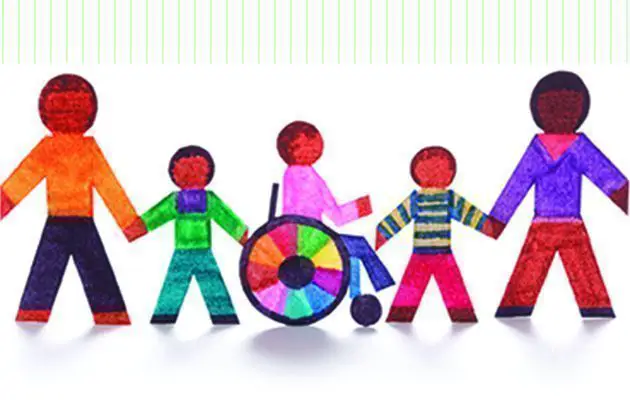When parents are busy raising a child who has special needs, grandparents’ support can be a vital resource.
Grandparents. The dictionary lists the word as a noun: a parent of one’s father or mother. Perhaps it should also include grandparenting as a verb, a word that describes caring for one’s grandchildren—whether or not they are children with special needs.
Twenty weeks along in her pregnancy, Brooke Cole discovered her baby Maggie had spina bifida. Immediately after Maggie’s birth, the fragile newborn was rushed into surgery and spent the next 18 days in the hospital undergoing unexpected treatments under the scrutiny of doctors and nurses. Like clockwork, every morning for each of those harrowing 18 days, Mamoo and Pops (Brooke’s parents, Melita and Brant Bryan) were there for the 7am doctor rounds. And, when the doctor returned at noon, there they were again—solid, ever-present and caring…
But Maggie’s story isn’t unique. Of the 11 million grandparents nationwide who have full- or part-time care of their grandchildren, 12 to 15 percent have a grandchild with a special need, according to Charlotte E. Thompson, an assistant clinical professor of pediatrics at the University of California Medical School in San Diego and the author of Grandparenting a Child with Special Needs.

A Grandparent’s Role
Multiple disabilities fall under the umbrella term “special needs,” including physical disabilities, emotional or behavioral disabilities, and developmental disabilities. It can be an intimidating diagnosis, and grandparents aren’t immune to the stages parents deal with-shock and disbelief; blame and disappointment; sadness and depression; acceptance; reality; and action, according to Arthur Kornhaber, author of The Grandparents’ Guide. Yet grandparents who are able to come to emotional terms and move quickly (and privately) beyond the first few stages toward accepting and dealing with their grandchild’s diagnosis can be lifesavers for families with a special needs child.
Debra Collins and her husband, Rusty, were there when their granddaughter, Jordan, was born. Debra remembers peering at Jordan through the nursery window, thinking something was wrong. Soon the pediatrician was talking to Collins and her teary-eyed son-in-law, and together they faced her daughter. The diagnosis: Down syndrome.
Her daughter cried so hard she couldn’t talk.
“I thought [Jordan] was dying,” Collins admits. But in contrast to mom, once she understood Jordan wasn’t in danger, the grandmother’s immediate response was relief. “I knew [Jordan] was going to have some problems with her health,” she says, “but we could handle that.” Primarily, Collins knew she had to be strong to help her daughter face what was to come.
In addition to handholding and shouldering tears, the role of a grandparent is all about support, reveals Jennifer Leister, a licensed professional counselor. And the support you need from a grandparent depends on the child, his or her special need, and your other children’s needs. If you already have one or two children and the third child has a special need, you may require a different type of support because you need support for your other two children, as well, Leister explains.
Great Grandparenting
While grandparenting a child with special needs requires no extraordinary, above-and-beyond skill, above all, the Collins and the Bryan families, like many in their situation, understand that the No. 1 “special need” of any child is unconditional love.
“Any time [children] can have access to their grandparents, they should. It’s a very unique bond, a very special bond,” agrees Leister.
Bryan agrees. She says that her bond with Maggie gives her as much as she believes it gives Maggie and her brothers.
And while Jordan, now 8 years old, might get a little extra doting from her grandfather, generally, He-Daddy and Granny (as the kids call them) treat all their grandkids the same.
“It’s a position you never hope to find yourself in, but the benefits are large,” says Bryan. “Maggie has a leg up because she has a gallery of people who adore her and a great support system for her parents.”
When parents understandably have their hands full, a little one-on-one time with the special-needs child can make the difference between success in school or simply learning to tie a shoe. “Even nonverbal kids have special abilities if you can help cultivate them,” encourages Thompson. And, “many autistic kids are brilliant. Helping them find that special area of interest makes you feel good and realize you’re really making a contribution to their life.”
Getting Your Parents More Involved
One way to engage your parents into your family’s transition is to involve them in the education process. The more your parents know about your child’s diagnosis, the more they’ll be inclined to help.
“Let them read your books. Let them learn from the experts the parents are learning from and then let them learn how to assist,” says Leister.
But this process shouldn’t stop at books—education can transcend into support at a doctor’s visit or meeting with therapists. Often, grandparents (or any extra pair of ears) can help filter out the emotional noise you may be experiencing out of frustration or grief, suggests Leister.
And an extra pair of ears and an extra set of hands can go a long way for a busy parent juggling the needs of multiple kids, especially if one child has special needs. It’s not uncommon for grandparents to offer respite to parents.
If a grandparent expresses nervousness at the notion of caring for the child alone, ask a trusted caregiver or friend to stay with the grandparent during the first couple of visits. “Maybe a good friend could stop in and have a cup of coffee,” Thompson suggests. Work up to short periods of one-on-one grandparent time if your mom or dad feels up to it.
But don’t be disappointed if your own parents don’t offer up their babysitting services-patience is a virtue of great benefit to parents with a special-needs child, says Leister. Plus, you should expect a period of adjustment amongst family members after your child’s diagnosis. “While going through the adjustment phase, there is normal anxiety,” Leister says. “There needs to be patience for everybody to work through the normal adjustment phase.”
More than anything, keep an open mind when it comes to delegating responsibilities to your child’s grandparents. “Many grandparents are very rigid about what they want to do,” says Thompson. “If they don’t want to be involved, or if they make the grandchild feel there’s something wrong with them, you don’t want them around anyway.” Leister agrees: “Don’t force it. Don’t be in denial. It all goes back to adjusting to everybody’s needs and comfort level.”
What Do You Do When Your Parents Declare “Hands-Off”?
Not all grandparents are willing or able to pitch in. Don’t harbor hard feelings if your parents choose to keep their distance, says Thompson.
You, as a parent, have plenty to focus on rather than forcing a relationship with your child on your parent. There are, however, some things you can do to bolster the rapport. The key to drawing in a hesitant grandparent is communication and understanding, according to Leister. Explain what you need, yet be willing to meet them where they are in the process.
Dr. Larry Watson, a private therapist and social worker, agrees. “If the child has medical needs, enable the grandparents. Make sure they have all the information and understand what’s going on,” he says. “This will help them treat the child with normalcy. The disability is not who they are. They are [children] with a disability—not a disabled child.”
When a grandparent is willing and able to help, start by asking that he or she take any of your children for special one-on-one time, Watson offers. “That fosters really special memories for the kids that [they] carry through their lives.”





















